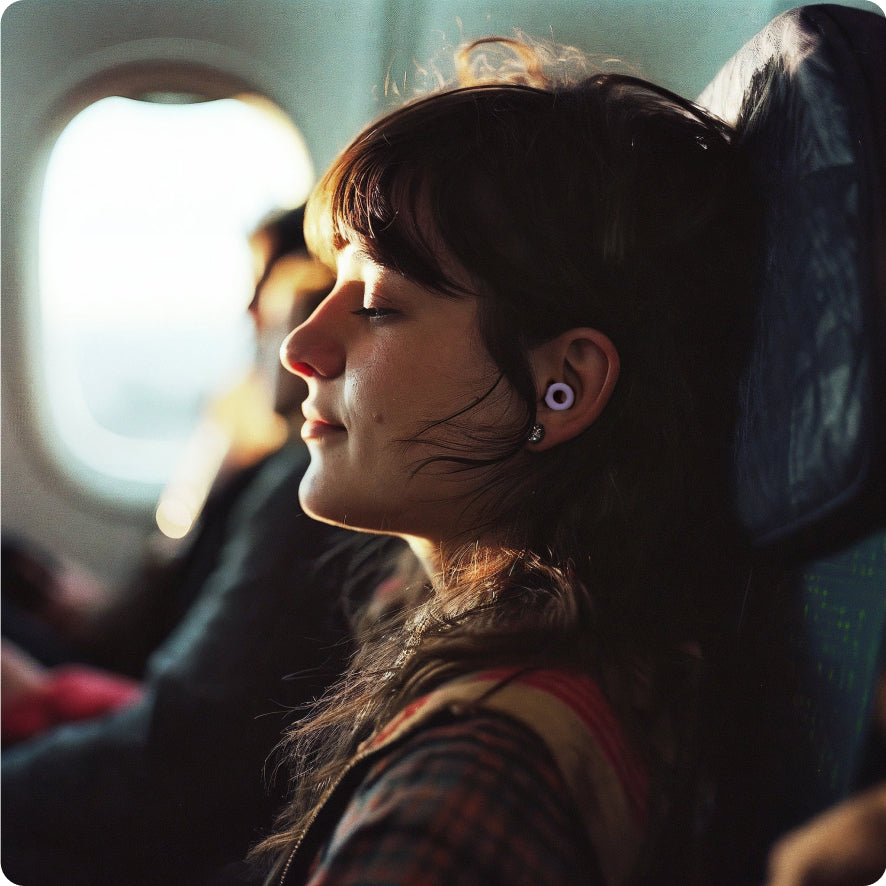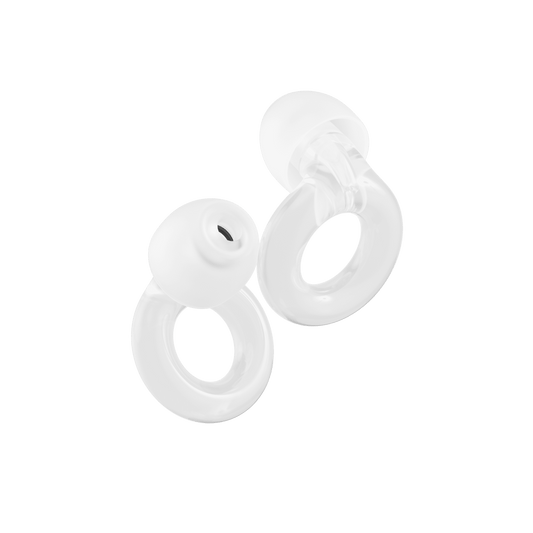Key takeaways:
- Noise-induced hearing loss is hearing loss that’s caused by exposure to loud noises
- Some of the symptoms include finding it difficult to hear high-pitched sounds, tinnitus, and speaking more quietly than usual
- Noise-induced hearing loss can be prevented by protecting your ears in noisy environments, with ear muffs or earplugs
We all live in a noisy world. While we may not always be aware of it, our constant exposure to loud noises, whether that is from our jobs, large gatherings, car exhausts, or listening to music through earbuds, can affect our ears.
Noise-induced hearing loss (NIHL) is classified as permanent damage to the cells within the ears called stereocilia. These cells are made of tiny hairs which impact our hearing and balance by sending electrical signals to the brain to alert it to sounds. These hairs are not replaceable and won’t regrow once they have been damaged, which can happen by exposure to loud, intense noises like gunshots, fireworks, and drilling. When these hairs become damaged by loud noises, NIHL occurs.
Noise-induced hearing loss can have a big impact on your quality of life – but the good news is that it’s preventable, which is why early detection, intervention and prevention are key. Here’s everything you need to know about noise and hearing loss prevention.

Signs and symptoms of noise-induced hearing loss
Because hearing loss from sustained exposure to loud noises can happen over a longer period of time, it can sometimes be difficult to notice when you experience symptoms of hearing loss.
Actually, many of us simply assume that any symptoms of hearing loss that we do pick up on are just signs of us getting older. But what we don’t realize is that some symptoms are not caused by the normal aging process, but are linked to sustained damage to the ear. But what are these symptoms and how are they different from hearing loss caused by aging?
Some of the key noise-induced hearing loss symptoms and signs of hearing loss caused by damage include:
- You may feel that people are speaking much more quietly than usual and it may seem like they are mumbling when speaking to you
- The degree of hearing loss is the same in both ears and is apparent when either ear is covered to test if the hearing ability is mirrored in both ears
- Lower pitched sounds become much easier to hear than higher pitched sounds
- The sounds “sh”, “s”, “th” and “f” become more difficult to hear and differentiate, and words which are similar, such as “sell” and “shell” may become difficult to distinguish
- You are able to hear sounds, for example noise at a party, but aren’t able to distinguish specifics about the sounds, such as what is being said
- Pain in the ears following exposure to loud noises, for example, pain after attending a musical festival
- Experiencing tinnitus in the ear, which presents itself either as a ringing, whooshing, buzzing or roaring sound within the ear
- Other people have commented that you seem to be speaking much more loudly than usual, even when there is minimal background noise
These symptoms of noise-induced hearing loss may develop gradually over time due to repeated exposure to loud noises. That means you may not notice them immediately, as this type of hearing loss tends to progress gradually – and it’s easy to dismiss the early signs, or put them down to other factors like hearing loss caused by aging.
So, if you believe that you or someone you know is experiencing any of these hearing loss symptoms, it’s important to seek medical advice as soon as possible. Ignoring the signs and symptoms will unfortunately only exacerbate the problem and can sometimes accelerate hearing loss.
Accessing medical advice as quickly as possible will give you the best options for managing your symptoms and preventing any further damage. While damage to the ear and subsequent hearing loss is usually permanent, there are fantastic technological advances in devices such as hearing aids and cochlear implants. They can help you to experience minimal impact on your daily lives and can continue to live life as normal.
Plus, noise-induced hearing loss is entirely preventable. So, if you notice any of the signs and symptoms of hearing loss, be sure to see your doctor or audiologist sooner rather than later.
How to prevent noise-induced hearing loss
As noise-induced hearing loss is usually permanent, it’s important to take precautions to protect the ears before any damage is done.
These preventative measures don’t mean that you have to stop going to concerts, work in a quieter place, or stop listening to music. When it comes to noise-induced hearing loss prevention, it’s still possible to enjoy all of your usual activities with minimal interruption. Here are some of the easiest ways to avoid hearing damage:
Wear ear muffs
As ear muffs create a seal around the ear, they are great at being able to reduce the decibels(dB) that a person is exposed to, offering high levels of noise reduction. This is particularly useful when attending music festivals and concerts, which can reach levels of 97 decibels – and even louder for rock concerts, which can be as noisy as 104 decibels.
Of course, one of the major drawbacks of ear muffs is that they muffle sound – it’s in the name, after all. That might work well if you work in a noisy environment, but it’s not so good for concerts, clubs, festivals and sporting events when you actually want to be able to hear everything that’s going on around you.
Wear earplugs
When you want to reduce sound levels while still being able to hear clearly, then earplugs are the way to go. But it’s important to choose the right type of earplugs. Traditional foam earplugs offer good noise reduction but, like ear muffs, they work by blocking sound out which means that sound quality isn’t great.
Instead, choose a pair of earplugs like Loop Experience. They combine a patented acoustic channel and mesh to filter them instead, keeping sound quality clear, just at a reduced volume, offering up to 18 decibels of noise reduction. And no matter how much you move, they’ll stay put in your ears.
Alternatively, try Loop Quiet for when you need to reduce the noise levels and find your focus, with up to 24 decibels of noise reduction. Or choose Loop Switch if you need an earplug that can do it all. With the convenience of 3 earplugs in 1, controlled by a single switch, these earplugs give you the power to switch between our Engage, Experience and Quiet modes depending on your environment.
10M+ happy customers
Our earplugs
Turn the music down
While it can be so easy to get carried away when enjoying a favorite song or watching a movie using earphones, it’s important to be aware that continuous exposure to moderately loud music can be just as harmful as exposure to a short, sharp noise which can damage the eardrum immediately. Many audio devices now have a feature allowing you to limit your volume, reducing your ability to play music too loud for your ears.
Get regular check-ups
Prevention is better than cure – but early detection comes a close second to prevention. If you have any concerns about your hearing, it’s always best to get your ears checked by your doctor or audiologist. Regular screenings can help you to stay on top of any issues and your audiologist can give you even more noise-induced hearing loss prevention tips, so you can continue to live the life you want – while keeping your ears safe.
Self-testing for hearing loss
Hearing tests are crucial when it comes to diagnosis of noise induced hearing loss – and self-testing can be a useful preliminary step to identify potential hearing problems. While it's not a substitute for professional evaluation, self-testing can provide valuable insights and help you to understand whether you should seek a professional evaluation. Self-testing is particularly useful for those who may be experiencing early signs of hearing loss or have concerns about their hearing health.
There are several methods for self-testing for hearing loss, including online hearing tests, smartphone applications, or simple at-home assessments. Some of these methods involve listening to tones or speech stimuli and responding accordingly to evaluate hearing sensitivity, while others ask you questions about how well you hear to try to get you to think about any potential problems.
Our hearing loss test is really simple to use. You simply need to answer a few questions about your hearing, and we’ll tell you if there’s anything to be worried about when it comes to your hearing health.
If the results of a self-test suggest potential hearing loss or you’re worried about your hearing health, it's crucial to consult a hearing healthcare professional. And make sure that you do it sooner rather than later – as early intervention can help address hearing issues effectively and improve your overall quality of life, meaning you can continue to hear well for years to come.

The Impact of Noise Sensitivity on Daily Lives: Unveiling the Statistics
There are as many as 6 million people with noise sensitivity in the UK We conducted a survey to ask “How much of a...

Unveiling the Top 5 Causes of Tinnitus
Discover the top 5 causes of tinnitus and gain insights into why your ears ring. Expert advice for identifying trigge...

Flip the Switch: Loop’s highest-tech earplug yet allows users to toggle betwe...
PRESS RELEASE Loop Earplugs is shaking things up this fall with the brand’s latest innovation in earwear – Loop Swit...

















